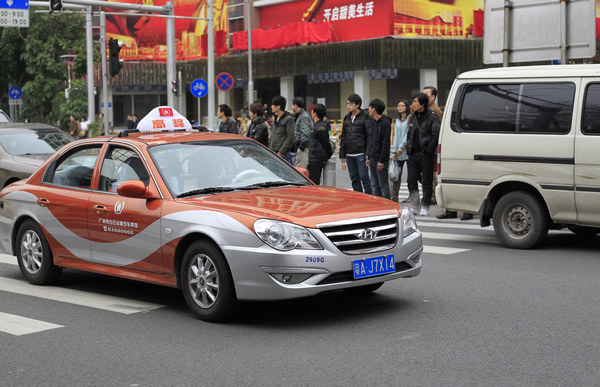|
|||||||||||
500 more to be put into service in coming days, says official
GUANGZHOU - Five hundred new cabs were put into service on Tuesday to help ease the heavy demand for taxis during rush hour in the city.
The new orange cabs are only allowed to operate between 7:30 am and 7:30 pm and they all have two Chinese characters meaning "rush hour" on top.
|
 |
|
An orange taxi designated for rush hour drives along a street in Guangzhou, Guangdong province, on Tuesday. Some 500 such cabs have been put into service since Tuesday. [Zou Zhongpin / China Daily] |
"The new cabs will help meet the growing demand for taxis from local residents and tourists," said Lin Chi, an official from the Guangzhou transport commission.
"Guangzhou government plans to increase the number of cabs by 1,000 during rush hour to help meet the city's great demand for taxis this year. And the rest of the 500 new cabs will gradually be put into use in the following days," Lin said on Tuesday.
"Relevant departments have introduced concrete and effective measures to ensure that the new cabs only operate during permitted hours," Lin said.
The cabs are equipped with global positioning systems and their fare meters will be locked from 7:30 pm to 7:30 am, he added.
Jin Wenzhou, deputy dean of the school of civil engineering and transportation under South China University of Technology, said the increase in the number of cabs would have little adverse effect on the city's normal taxi business or on the income of taxi drivers.
Guangzhou, which has a population of more than 12 million, has around 17,000 cabs in service, Jin said.
"Lack of cabs, plus the city's traffic jams, have made local residents and tourists feel that it's difficult to take a taxi in the city, particularly during rush hour," he added.
But Jin said he was against blindly increasing the number of cabs in the city in the future.
Many local residents have welcomed the increase in the number of cabs.
Chen Chuxin, who works in Guangzhou's Tianhe district, said the city needed to increase its cab fleets to meet growing demand.
"I always find it very difficult to take a taxi in the busy Tianhebei road after work in the afternoon," he said.
But Bu Huaili, a Guangzhou taxi driver, said the increase would raise competition among the city's taxi drivers and affect their income.
"The increase will make the city's traffic jams even worse in the coming months," he said.
Local residents are reluctant to take taxis because of the city's traffic jams, he said.
Bu said a taxi driver now earns between 4,000 and 5,000 yuan ($635-$790) a month.
He urged relevant departments to introduce effective measures to improve the traffic flow and tackle the city's traffic jams, instead of merely increasing the number of cabs.
Related Stories
Taxis in Chongqing set to go high-tech 2012-02-28 16:00
New rules for China's 2 million cabbies 2012-02-28 15:03
Hot Topics
Wu Ying, iPad, Jeremy Lin, Valentine's Day, Real Name, Whitney Houston, Syria,Iranian issue, Sanyan tourism, Giving birth in Hong Kong, Cadmium spill, housing policy
Editor's Picks

|

|

|

|

|

|







